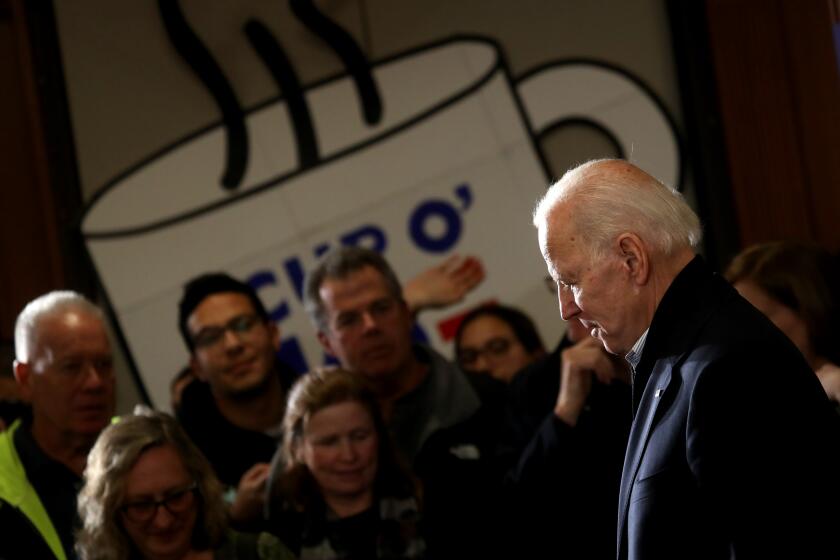Democrats vote to shake up presidential primary calendar, putting South Carolina first
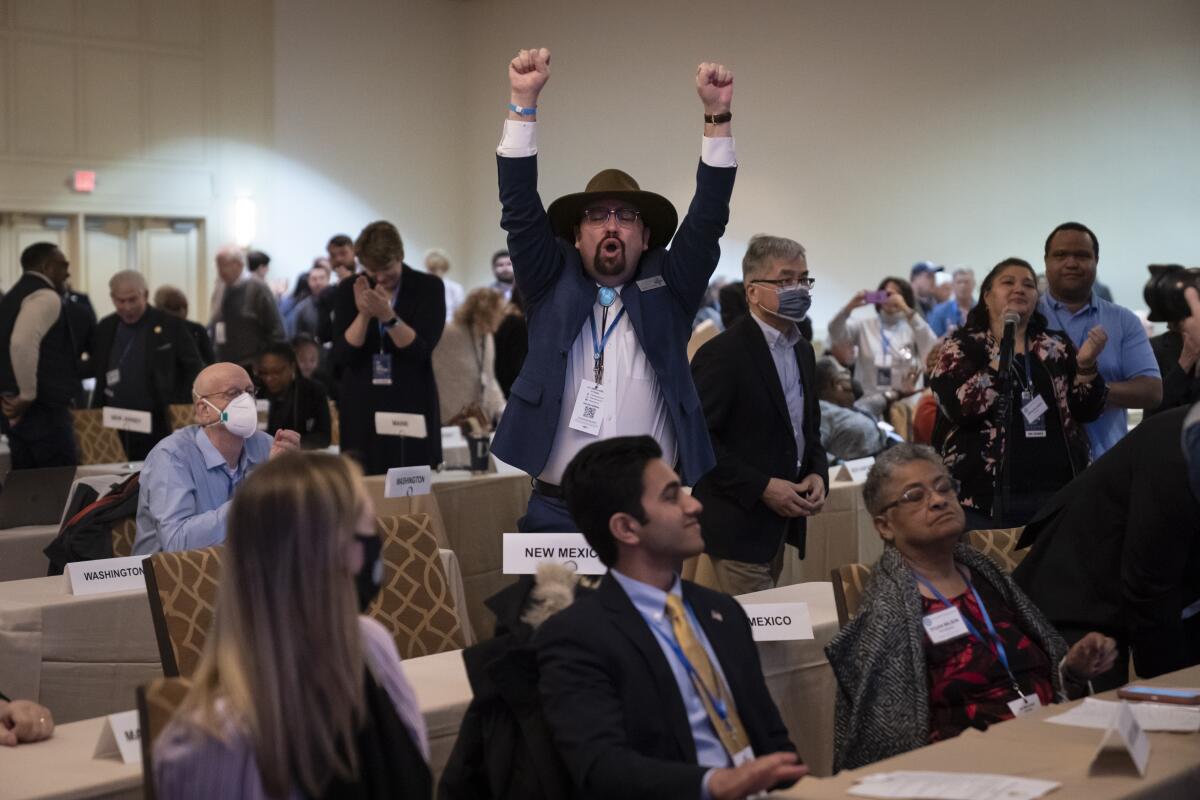
- Share via
PHILADELPHIA — Democrats voted Saturday to allow South Carolina to hold the party’s first presidential primary next year, ending nearly 50 years of Iowa and New Hampshire leading the party’s nominating season.
Under the new calendar, proposed based on recommendations from President Biden, candidates would face voters in South Carolina on Feb. 3, followed by Nevada and New Hampshire on Feb. 6, then Georgia and Michigan. But the new calendar faces additional hurdles, namely a lack of cooperation from Republican leaders in New Hampshire and Georgia.
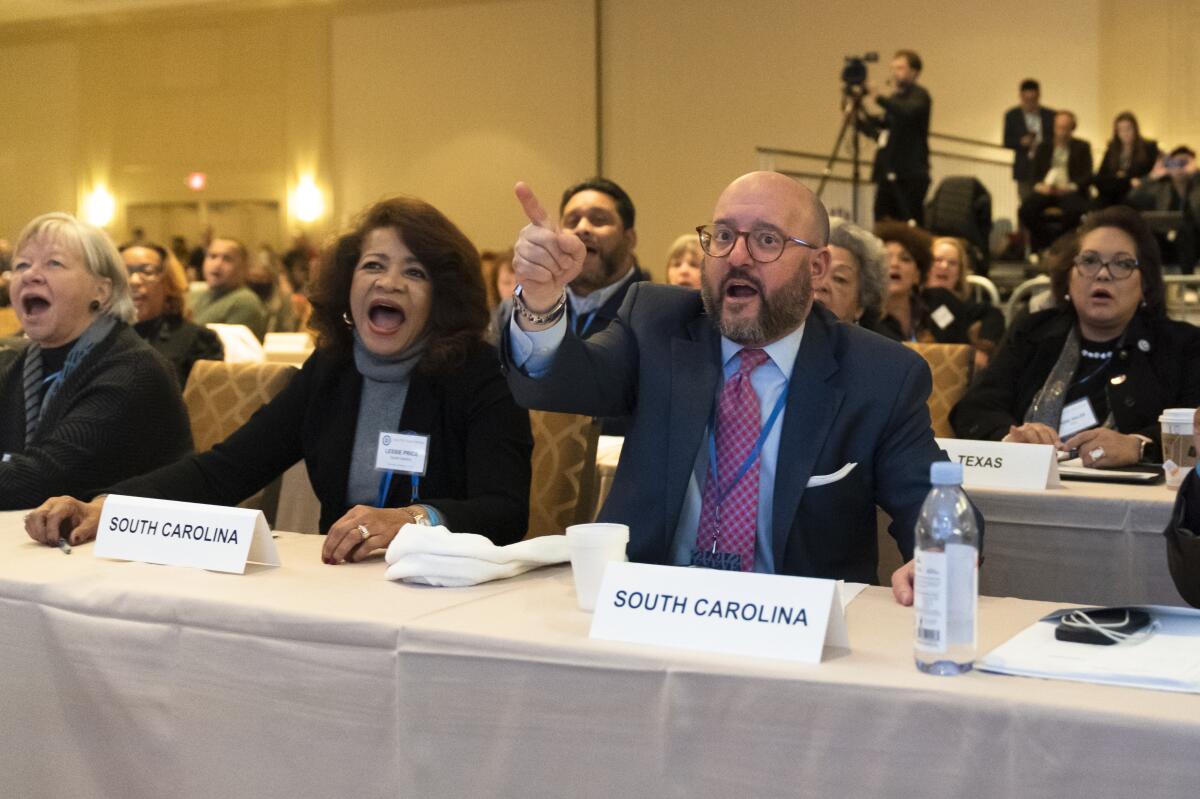
Party leaders praised the new calendar, saying it will elevate the voices of Black and Latino voters, and transform the early nominating process to better reflect the demographics of the Democratic Party.
“This calendar reflects the best of who we are as a nation and it sends a powerful message,” said Democratic National Committee Chairman Jaime Harrison. “The Democratic Party looks like America, and so does this proposal.”
As suggested, the plan also allows Biden to reward South Carolina, where his first-place finish in the state’s 2020 Democratic primary helped revive his campaign after losses in Iowa and New Hampshire.
Biden has hinted that he plans to seek reelection. During a speech Friday to Democratic National Committee members he laid out his administration’s accomplishments and said there’s more work to do.
“Let me ask you a simple question: Are you with me?” he said, prompting chants of “Four more years!”
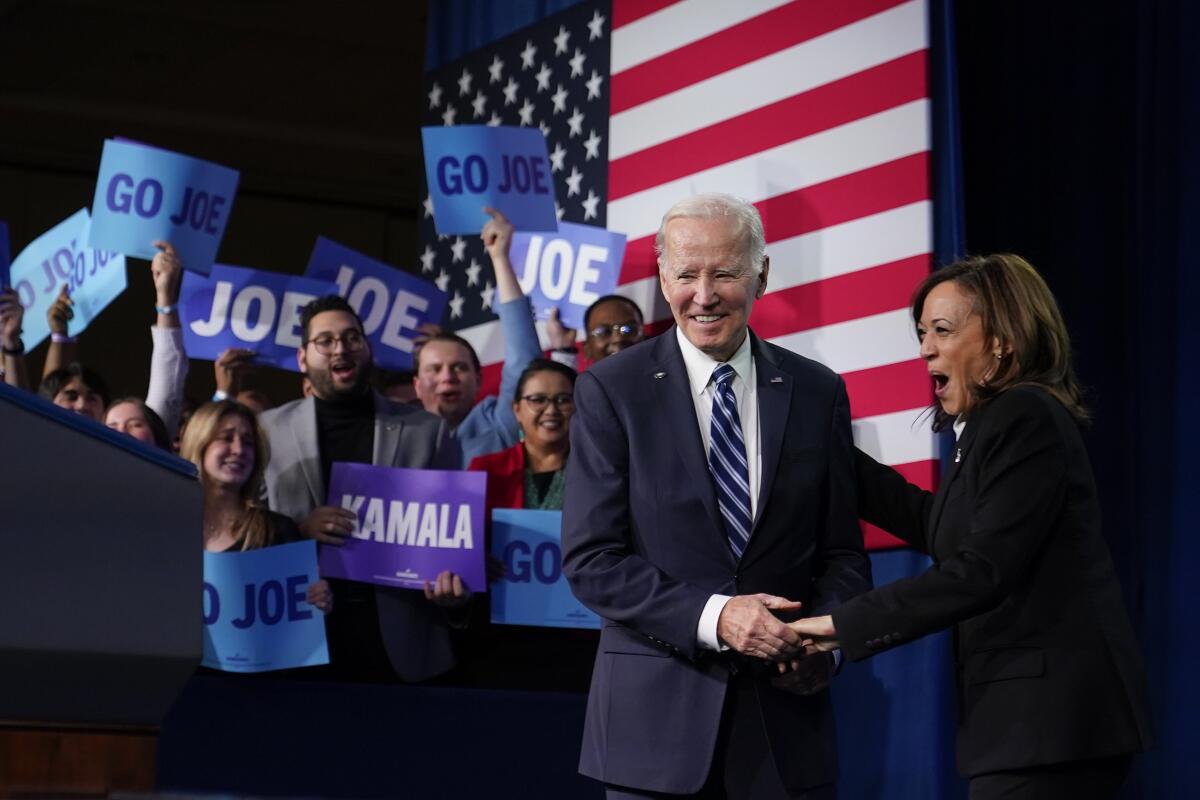
The president isn’t likely to face a competitive primary challenge. Some Democrats who might have run against him, including California Gov. Gavin Newsom and Sen. Bernie Sanders (I-Vt.) have said they won’t get in the race if Biden runs.
The proposal to change the primary calendar was first advanced by the party’s Rules and Bylaws Committee in December, before coming to a vote before the full party committee at its winter meeting in Philadelphia. The plan passed by voice vote with overwhelming support and only a handful of “nay” votes.
Some have criticized Biden for handpicking the states in which he’d need to campaign to seek reelection. Supporters of the president say now — ahead of what could be an uneventful primary — is the best time to overhaul the schedule.
Whether the presidential primary calendar plays out the way Democrats intend it to is another matter.
Republicans have already selected Iowa, New Hampshire, South Carolina and Nevada to hold their early elections. Republican leaders in both New Hampshire and Georgia have said they won’t hold separate primaries.
The future of New Hampshire’s century-old, first-in-the-nation primary is on shaky ground as the national Democratic Party seeks to reassert its control over a process that’s been centered on traditions and dominated by smaller, predominantly white states.
Under Democratic Party rules, no state or territory is allowed to hold a presidential nominating contest before March unless granted a waiver by the national party. For nearly 50 years, Iowa and New Hampshire have held the first caucus and primary. In 2008, Nevada and South Carolina were added to the early window.
In recent cycles, the waiver process was straightforward for the traditional early states, despite longstanding complaints about Iowa’s complex caucus system and its continued elevated status alongside New Hampshire.
Iowa’s fate was likely sealed in 2020, when state Democrats rolled out a buggy app and failed to deliver election results on time. Saturday’s vote means Iowa Democrats will have to hold their caucus no earlier than March to avoid sanctions from the national party.
New Hampshire hasn’t fared much better. Technically, New Hampshire was demoted from the first primary state to tie for second with Nevada, but only if Republican Gov. Chris Sununu and the state’s GOP-led Legislature decide to expand mail voting and repeal a state law that protects the coveted status of the state’s presidential primary.
Sununu, who is considering a presidential run, has made clear he has no intention of helping Democrats implement their calendar.
“We’re going first no matter what,” he told USA Today last month, accusing the Democratic Party of trying to “manipulate the system” to help Biden.
New Hampshire Democrats have defended their traditional role in the primaries, saying the state’s small size, cheap media markets and engaged voters make it an ideal place for candidates to try their luck. But they have also pointed to their inability to change state law.
“We’re in an impossible, no-win position,” New Hampshire Democratic Party Chair Raymond Buckley told reporters Friday. “We cannot unilaterally change state law.”
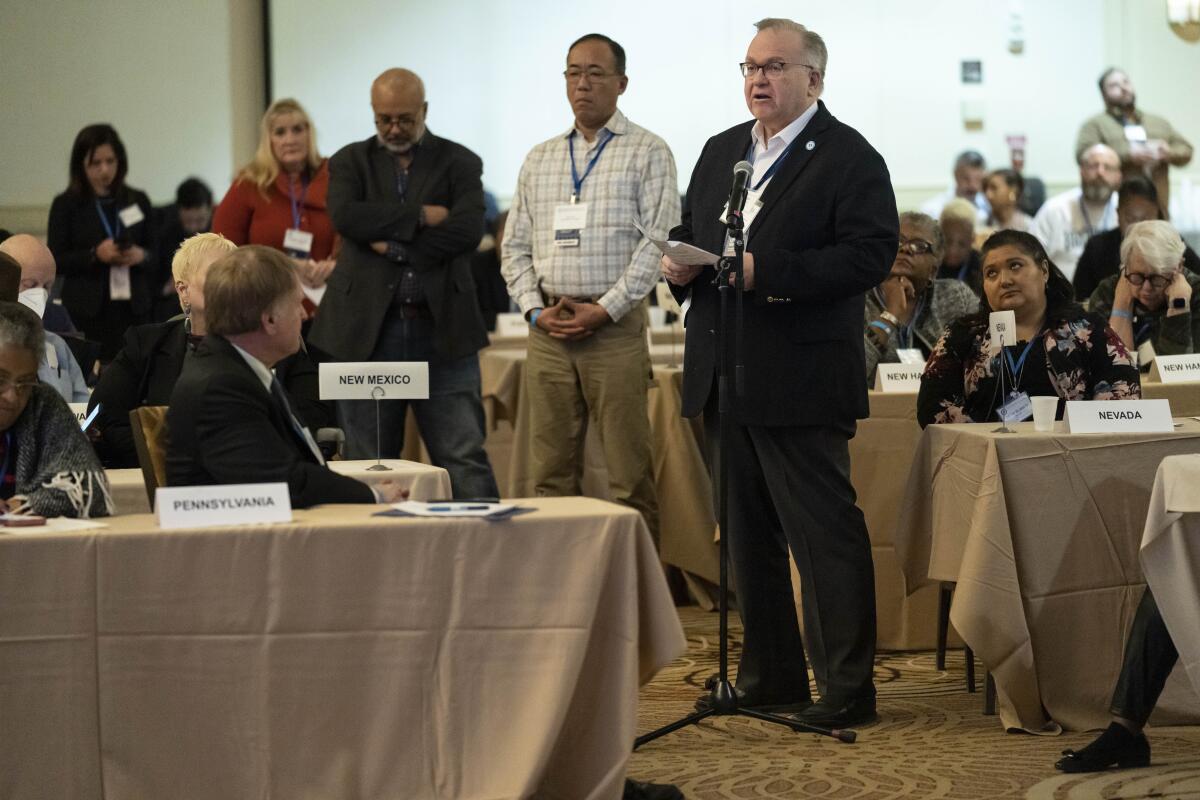
Buckley said New Hampshire Democrats are ready to face whatever punishment the national party places on the state, as long as it doesn’t hurt their candidates running in less prominent races next year.
Since 1975, state law in New Hampshire has required its secretary of state to set the date of the presidential primary one week before any similar contest — meaning after the Iowa caucus, but before contests held in any other primary states.
The influence of that law, however, is limited to the Granite State. Democratic National Committee members say the party, not individual states, controls the nominating contest. Saturday’s vote is seen as a step toward making the nominating process more accessible to other states. States were able to apply for the early window spots and will have a chance to apply to lead the calendar in the 2028 presidential cycle as well.
“Here’s the reality: No one state should have a lock on going first,” said Democratic Rep. Debbie Dingell of Michigan.
Democrats debated the proposal for about an hour. Party members from Iowa and New Hampshire opposed the new schedule, warning it would make things harder for Democrats heading into the 2024 general election.
Scott Brennan, a DNC committee member from Iowa, said that advancing the proposal would introduce uncertainty into the process.
New Hampshire missed deadlines last month to meet the terms of its waiver, as did Georgia, where state leaders have not moved up the state’s primary. The party’s Rules and Bylaws Committee voted last week to give the states until June 3 to make progress, which is unlikely.
“We can vote on this calendar, we can approve this calendar, but we will leave here with absolutely nothing settled,” Brennan said.
New Hampshire Democrats have warned that the party’s new calendar gives Republicans in their state an opportunity to criticize Democrats and make inroads with independents in a competitive state. They have frequently noted that former Vice President Al Gore would have won the 2000 presidential election had he not lost New Hampshire by a few thousand votes.
“This is not, in this moment, about New Hampshire’s history or our pride, this is about state laws that we cannot unilaterally change,” said Joanne Dowdell, a DNC member from New Hampshire who serves on the Rules and Bylaws Committee. “It’s about the unintended consequences the DNC’s actions could have on President Biden’s reelection campaign.”
Iowa and New Hampshire party members were the only ones to speak against the proposal, which was praised by the leaders of the states that advanced, the DNC’s Southern Caucus and others.
Artie Blanco, a Rules and Bylaws Committee member from Nevada, said Democratic voters in her state — a labor union stronghold and the third most racially diverse state in the country — represent the future of the party.
“You can’t say you’re for elevating this coalition’s voice, but still ask us to wait our turn,” Blanco said. “I’m done waiting.”
More to Read
Get the L.A. Times Politics newsletter
Deeply reported insights into legislation, politics and policy from Sacramento, Washington and beyond. In your inbox twice per week.
You may occasionally receive promotional content from the Los Angeles Times.
